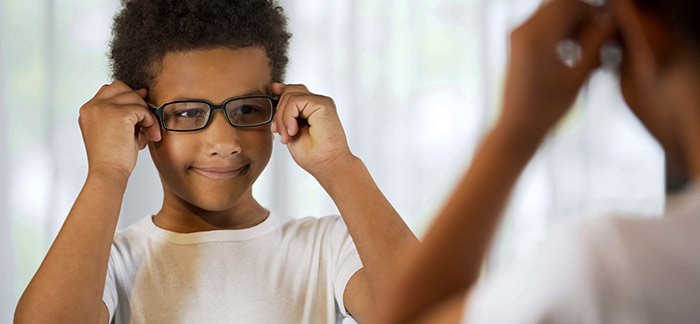
A child's vision provides an important source of information about the world around them. Thus, an uncorrected vision problem can interfere with a child's ability to learn and reach his/her highest potential.
In a landmark study conducted by researchers from Johns Hopkins University students who were provided with corrective eyewear experienced improvements in math and reading, their classroom behavior improved, and they were better able to focus on class discussion and assignments. The study, published on the Hopkins Medicine website provides evidence that spectacles not only help children see more clearly but achieve more academically. Furthermore, the study concluded that to maximize impact a single pair of spectacles can make a dramatic improvement in how you see the world, but the effects are only as current as your prescription.
Every child needs to have the following vision skills for effective reading and learning:
- Visual acuity—the ability to see clearly in the distance for viewing the chalkboard, at an intermediate distance for the computer and up close for reading a book.
- Eye Focusing—the ability to quickly and accurately maintain clear vision as the distance from objects change, such as when looking from the chalkboard to a paper on the desk and back.
- Eye tracking—the ability to keep the eyes on target when looking from one object to another, moving the eyes along a printed page or following a moving object like a thrown ball.
- Eye teaming—the ability to coordinate and use both eyes together when moving the eyes along a printed page, and to be able to judge distances and see depth for classwork and sports.
- Eye-hand coordination—the ability to use visual information to monitor and direct the hands when drawing a picture or trying to hit a ball.
- Visual perception—the ability to organize images on a printed page into letters, words, and ideas and to understand and remember what is read.
Understanding children’s eyesight

It’s important to remember that the visual needs of children constantly change as they get older. Between the ages of 6 and 12, children may start to develop short-sightedness, or myopia. This can leave many children struggling to see the board.
Many children at this age won’t recognise that there is something wrong with their vision, and it is likely they will struggle on without notifying you. This could have a huge impact on their performance at school.
What signs should you look out for?
There are some signs that can indicate your child has a vision problem.
- Frequent eye rubbing or blinking
- Short attention span
- Avoiding reading and other close activitie
- Frequent headache
- Covering one eye
- Tilting the head to one side.
- Holding reading materials close to the face
- An eye turning in or out
- Seeing double
- Losing place when reading.
- Difficulty remembering what he or she read.
Undetected and untreated, vision problems can elicit some of the very same signs and symptoms commonly attributed to ADHD, like hyperactivity and distractibility. Due to these similarities, children eliciting these symptoms should have a comprehensive eye test with an optometrist to avoid misdiagnosis.
How can spectacles help them?

Wearing spectacles is one of the simplest and most effective solutions to treat refractive errors, and there are specialist frames available to suit young children. Once your child starts school, it’s recommended they have an eye examination at least every year as they continue to develop. By providing children with the right lenses for their needs, it can help to restore their enjoyment and development in school.
Since 2008, Spec-Savers have helped over 300 000 children through our Kids Right to Good Sight initiative. With parents' permission, we offer a free eye examination, pair of frames and clear lenses for children aged 6 to 12 years to dramatically improve their lives.
We believe in the future leaders of our nation and the Kids Right To Good Sight initiative is our pledge as a brand to making a lasting difference in the lives of young children. Detecting vision impairment at such an early stage, has a lasting impact on any child.
Date Published: 10 November 2021
